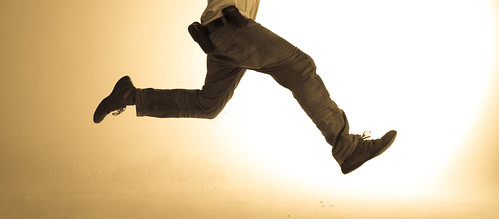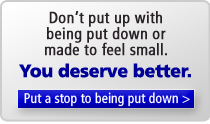The Real Secret to Consistent Confidence
 Tina was a client who told me how she’d given a great presentation once, but has bottled it every time since then
Tina was a client who told me how she’d given a great presentation once, but has bottled it every time since then
Rob mentioned to me that he’d bungee jumped once when he was travelling around Australia, but has held himself back from leaping into the abyss ever since.
Ella explained to me how she once opened up emotionally to her partner and revealed a vulnerability, but has since built those walls up again and doesn’t know how to talk openly.
One of the first things I ask a new client is “Tell me something you’ve done that took confidence”, and I’ve given you just 3 examples from a couple of hundred.
Giving a great presentation once doesn’t mean you’re a great presenter – you just gave a great presentation once. Going bungee jumping once doesn’t mean you’re always ready to leap – you just let gravity do its thing once. And opening up emotionally doesn’t mean you’re an open, emotionally intelligent person – you just let the moment take you once.
Confidence is being able to trust your behaviour with implicit trust in that behaviour, and that’s not a one-time thing. That’s why I always ask that question, because I know it makes 2 things abundantly clear.
Confidence is always there.
It’s easy to be confident when you’re feeling confident, just as Tina, Rob and Ella found. You could say that the 3 of them had a distinct lack of feeling not-confident; they found themselves in a place where there was no un-confidence; the one thing that was absent from each of their experiences was a loss of confidence. See what I’m getting at?
Your confidence never goes away. It diminishes the more you ignore it or when you forget it, but it’s always there waiting for you to use it. More and more I’m seeing confidence as your natural state. It’s how you are when all the crap that gets in the way of you feeling confident is removed.
That’s my favourite thing about confidence – it’s like the very best friend you never had. You can bad-mouth it, disparage it, ignore it and even punch it square in the jaw, and it will always be there, willing to help you.
Watching a client as they discover that THEIR confidence is right there, waiting for them, is simply awesome.
Confidence is applied at the point of change
Confidence has to be applied at the point of change – the point that tips what happens next one way or the other – and it needs to be applied consistently.
The point of change is that moment in time where you choose between fear and action, doubt and decision, function and dysfunction, capability or disability, strength or weakness, assumption or insight. That list goes on, but the only way you get to choose which way to go is to be mindful of the point of change itself, and then to mindfully apply confidence.
How do you that?
Practice.
Practice is the only way you can train your brain in a new way of thinking; it’s the only way to set up new patterns of thought that work better and become the norm for you. You gotta show your brain that the way it’s done things in the past might not be the best way, and if you can come up with a more effective way then your brain will love it.
See it and apply it, and your life will be every bit as extraordinary as you always hoped it would be.
What’s something you’ve done that took confidence?
Have trouble applying confidence at the point of change?
Feel like your confidence ISN’T there waiting for you?
Let me know in the comments.
- Other articles you might like:
- Scared to Change? Embrace Your Inner Wimp
- Are you a 10 stone confidence weakling?
- Why Do You Lose Confidence in Yourself?



 What are you good at? Singing? Cooking? Leading a team? Empathy? Maths? Design? Running?
What are you good at? Singing? Cooking? Leading a team? Empathy? Maths? Design? Running? “I think you’re right to think of it as a meta-circuit — and also one that gets built from the earliest ages — and thus would be immune to quick fixes. So while it grows exactly like a skill, it’s also pretty well wired in so that it’s easy to fall into old patterns. One neurologist I spoke with compared existing behavioral patterns like sled tracks on a snowy hill — the more you behave in a certain way, the more likely your sled is to fall into those tracks. So that “backsliding” moment you’re speaking of — when someone seems to have it, but still falls into old patterns of non-confidence — would be expected. Even if they’ve worked with you for a year, they’ve still got decades of “non-confidence” circuitry that’s fast, fluent, and ready to fire.
“I think you’re right to think of it as a meta-circuit — and also one that gets built from the earliest ages — and thus would be immune to quick fixes. So while it grows exactly like a skill, it’s also pretty well wired in so that it’s easy to fall into old patterns. One neurologist I spoke with compared existing behavioral patterns like sled tracks on a snowy hill — the more you behave in a certain way, the more likely your sled is to fall into those tracks. So that “backsliding” moment you’re speaking of — when someone seems to have it, but still falls into old patterns of non-confidence — would be expected. Even if they’ve worked with you for a year, they’ve still got decades of “non-confidence” circuitry that’s fast, fluent, and ready to fire. If you’ve arrived somewhere in life you didn’t expect it feels pretty scary. Unfamiliar territority, new people, new challenges – it’s easy to lose confidence when you’re somewhere new.
If you’ve arrived somewhere in life you didn’t expect it feels pretty scary. Unfamiliar territority, new people, new challenges – it’s easy to lose confidence when you’re somewhere new. But sometimes your brain is where the problem lies. There are times when your brain picks a really old map, something it’s used time and time again successfully, but it completely forgets that the landscape might have changed. In the blink of an eye your brain picks a pattern of behaviour that’s out of date and no longer matches with who you are and what matters to you today. Sometimes, your brain picks a route that emphasises safety over results.
But sometimes your brain is where the problem lies. There are times when your brain picks a really old map, something it’s used time and time again successfully, but it completely forgets that the landscape might have changed. In the blink of an eye your brain picks a pattern of behaviour that’s out of date and no longer matches with who you are and what matters to you today. Sometimes, your brain picks a route that emphasises safety over results. In addition to switching roles at the tip of a hat, you also carry around a huge, fat rulebook, containing all the stuff that you and other people should do.
In addition to switching roles at the tip of a hat, you also carry around a huge, fat rulebook, containing all the stuff that you and other people should do. I want you to forget all about self-confidence. That’s my aim for everyone I work with and that’s a point I want EVERYONE to reach.
I want you to forget all about self-confidence. That’s my aim for everyone I work with and that’s a point I want EVERYONE to reach.